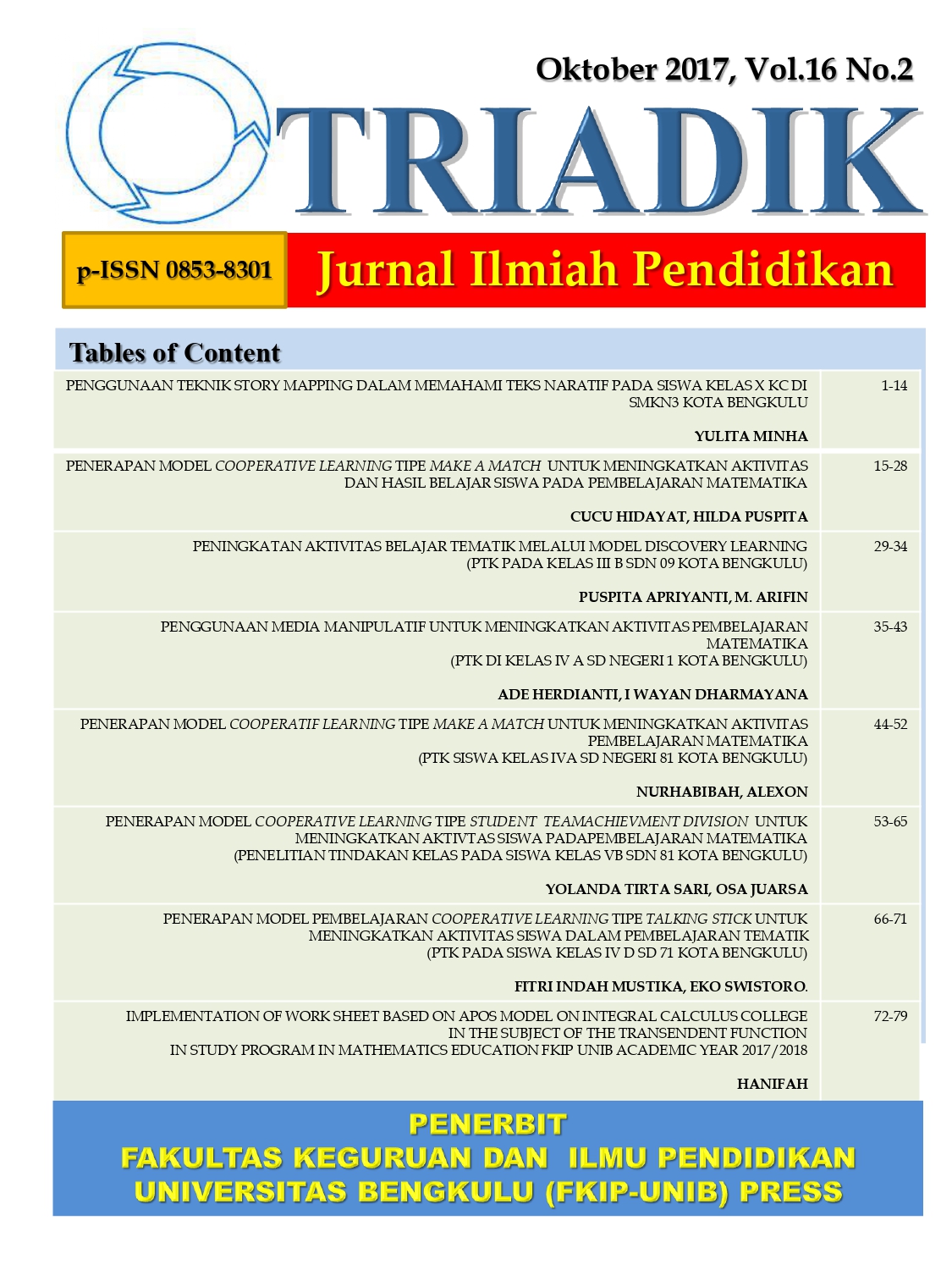Main Article Content
Abstract
Abstract: This study aimed to increase the activity and learning outcomes of mathematics by applying Make A Match Model in class IV C SDN 1 Kota Bengkulu. The subjects of this study amounted to 30 students. Data collection techniques used were observation, interview, and documentation. The data collected in this study were observational data of student and teacher activities in mathematics learning and matehematics test results. Data analysis techniques used descriptive statistical analysis and quantitative analysis. The results of this study indicate an increase in students activites and learning outcomes in mathematics learning. This was show from cycle 1, II and III. The ss’activities has increased compared to the pre-cycle. The results students activities meet the criteria for success of action, name ly the success of the learning process by students is said to be good, if every aspect of theobservation sheet students all come up with information that has been carried out well and the average value of students is ? 70 and increases each cycle so that classical learning completeness is achieved that is 75%.. Thus, the application of the learning model Make a Match can increase the student activity and learning outcomes in mathematics learning in grade IV C of SDN 1 Kota Bengkulu.
Keywords: Make a Match, Activities and student learning outcomes, mathematics learning
Article Details
Copyright (c) 2019 Cucu Hidayat, Hilda Puspita

This work is licensed under a Creative Commons Attribution-ShareAlike 4.0 International License.
References
- DAFTAR PUSTAKA
- Abdullah. 2008. Hakikat Pembelajaran Matematik. http://cumanulisaja.blogspot.com/2012/10/hakekat-pembelajaran-matematika-di-sd.html
- Hamalik, Oemar. (2012). Kurikulumdan Pembelajaran. Jakarta: BumiAksara
- Heruman. 2008. Model Pembelajaran Matematika. Bandung : PT Remaja Rosdakarya.
- Huda, Miftahul. 2012. Cooperative Learning: Metode, Teknik, Struktur, dan Model Penerapan. Yogyakarta: Pustaka Pelajar.
- Intelectual Club (SIC). Depdiknas. 2006. Kurikulum Tingkat Satuan Pendidikan. Jakarta: Balai Pustaka.
- Isjoni. 2007. Cooperative Learning Efektivitas Pembelajaran Kelompok. Bandung: Alfabeta.
- Johnson dan Rlaing (2003). Pembelajaran Matematika. (dalam http://digilib.uinsby.ac.id/106 72/8 /bab%202.pdf)
- Muhsetyo, Gatot. 2008. Pembelajaran Matematika SD. Jakarta: Universitas Terbuka
- Murniati, Endyah. 2007. Kesiapan Belajar Matematika di Sekolah Dasar. Surabaya: Surabaya
- Rusman, 2012. Model-model Pembelajaran: Mengembangkan Profesionalisme Gur. Raja Grafindo Persada: Jakarta.
- Suwangsih, Erna & Tiurlina. 2006. Model Pembelajaran Matematika. Bandung : UPIPres.
- Wardhani. 2010. Analisis SI dan SKLMata Pelajaran Matematika SMP/MTs untuk Optimalisasi Tujuan Mata Pelajaran Matematika. Yogyakarta: Departemen Pendidikan Nasional Direktorat Jenderal Peningkatan Mutu Pendidik Dan Tenaga Kependidikan Pusat Pengembangan Dan Pemberdayaan Pendidik Dan Tenaga Kependidikan (PPPPTK) Matematika.
References
DAFTAR PUSTAKA
Abdullah. 2008. Hakikat Pembelajaran Matematik. http://cumanulisaja.blogspot.com/2012/10/hakekat-pembelajaran-matematika-di-sd.html
Hamalik, Oemar. (2012). Kurikulumdan Pembelajaran. Jakarta: BumiAksara
Heruman. 2008. Model Pembelajaran Matematika. Bandung : PT Remaja Rosdakarya.
Huda, Miftahul. 2012. Cooperative Learning: Metode, Teknik, Struktur, dan Model Penerapan. Yogyakarta: Pustaka Pelajar.
Intelectual Club (SIC). Depdiknas. 2006. Kurikulum Tingkat Satuan Pendidikan. Jakarta: Balai Pustaka.
Isjoni. 2007. Cooperative Learning Efektivitas Pembelajaran Kelompok. Bandung: Alfabeta.
Johnson dan Rlaing (2003). Pembelajaran Matematika. (dalam http://digilib.uinsby.ac.id/106 72/8 /bab%202.pdf)
Muhsetyo, Gatot. 2008. Pembelajaran Matematika SD. Jakarta: Universitas Terbuka
Murniati, Endyah. 2007. Kesiapan Belajar Matematika di Sekolah Dasar. Surabaya: Surabaya
Rusman, 2012. Model-model Pembelajaran: Mengembangkan Profesionalisme Gur. Raja Grafindo Persada: Jakarta.
Suwangsih, Erna & Tiurlina. 2006. Model Pembelajaran Matematika. Bandung : UPIPres.
Wardhani. 2010. Analisis SI dan SKLMata Pelajaran Matematika SMP/MTs untuk Optimalisasi Tujuan Mata Pelajaran Matematika. Yogyakarta: Departemen Pendidikan Nasional Direktorat Jenderal Peningkatan Mutu Pendidik Dan Tenaga Kependidikan Pusat Pengembangan Dan Pemberdayaan Pendidik Dan Tenaga Kependidikan (PPPPTK) Matematika.
